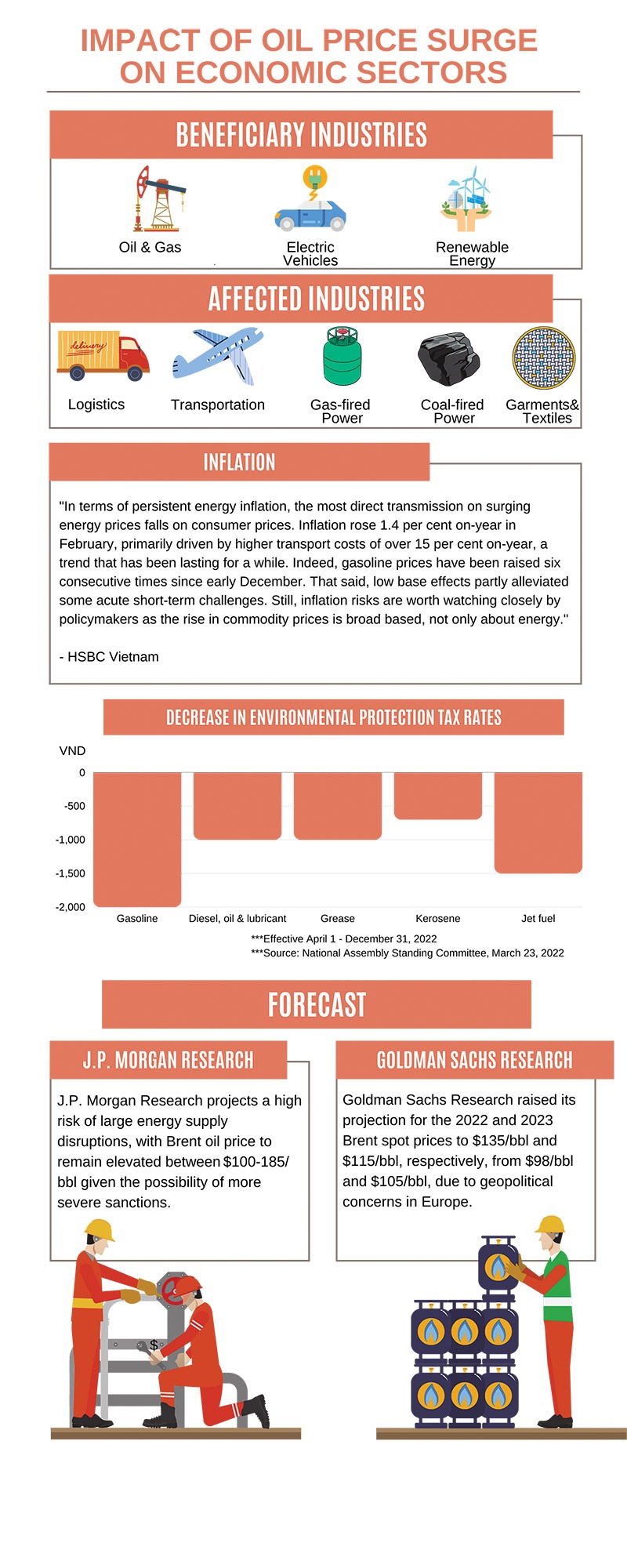Manufacturers and retailers battling to stabilise product prices amid fuel hikes
Phan Van Dung, deputy general director of food processing group Vissan JSC, said that the selling prices of materials are strongly fluctuating, making it hard for the company to maintain product price stability.
“In late December, Vissan forecasted that in the first quarter of 2022 there would be a fluctuation in the price of raw materials with 10-30 per cent in rises. However, at the time, we did not anticipate the sharp and continuous adjustment in gas prices. We cannot immediately change the selling prices of products because the current purchasing power is too low,” said Dung.
Vissan’s plight is also being felt at many other businesses across the country. Tran Lam Hong, deputy general director of Saigon Co.op, said that since the beginning of March, the company has been receiving a series of requests to increase prices from suppliers.
“However, we have had to negotiate with them to hold back the adjustment as much as possible,” said Hong. “Both sides are looking for ways to restrain the price increase, but it is just a temporary solution,” said Hong. “We know that the adjustment in selling prices will make the purchasing power drop, but there is no other choice.”
Facing the same difficulty during the operation process, Vicem Hoang Thach Cement Co., Ltd., reported that on average, the company uses about one million litres of gasoline every year, 500,000 litres of kiln drying oil, 120,000 tonnes of coal, and 380 million kWh of electricity to operate the production lines.
Early last week, retail petrol prices were reduced slightly but remain at a very high level. Specifically, the retail price of RON95 bio-fuel dropped to VND29,192 ($1.27) per litre at most, whereas that of E5RON92 was adjusted down by to no more than VND28,330 ($1.23) per litre.
Thus, the current fuel prices have pushed up production costs sharply. In addition, the consumption and import of input materials of the company were also significantly affected by the high domestic gas prices.
Gasoline prices dropped by around 2.3 per cent on March 21, the first time after seven consecutive upward adjustments since December. However, RON95 prices were already up by over 30 per cent, while those of biofuel E5 RON92 have risen 31 per cent.
Manufacturers and retailers are being forced to apply a number of solutions to save production costs.
At Vicem Hoang Thach Cement, Technical Division head Do Hoang Linh told VIR the company is currently looking for alternative fuel to replace a part of coal dust. Previously, in order to save energy costs, the company also invested in upgrading the control system, replacing old-generation components, and renovating many devices to increase life expectancy and improve efficiency.
Tran Thi Phuong Lan, acting director of the Hanoi Department of Industry and Trade, said that the department is calling on retailers and suppliers to sign long-term contracts with commitments to stabilise prices, which will contribute to reducing impact of fuel price fluctuations on goods’ sales.
Meanwhile, according to the Food and Foodstuff Association of Ho Chi Minh City (FFA), manufacturers are looking for ways to reduce transport costs by coordinating with distributors to transport goods at the most reasonable costs.
For example, manufacturers often used to make several trips to transport a large order to different distributors, but now businesses try to take only one trip with a large truck.
However, according to Ly Kim Chi, chairwoman of the FFA, in order to restrain the selling prices of products, they need support from the government. “The government needs to assign the Ministry of Industry and Trade to issue solutions to stabilise the price of fuel. There should also be a schedule for gasoline selling price adjustment in order that manufacturers have time for preparation,” Chi said.
 |
What the stars mean:
★ Poor ★ ★ Promising ★★★ Good ★★★★ Very good ★★★★★ Exceptional
Related Contents
Latest News
More News
- Customs reforms strengthen business confidence, support trade growth (February 01, 2026 | 08:20)
- Vietnam and US to launch sixth trade negotiation round (January 30, 2026 | 15:19)
- Digital publishing emerges as key growth driver in Vietnam (January 30, 2026 | 10:59)
- EVN signs key contract for Tri An hydropower expansion (January 30, 2026 | 10:57)
- Vietnam to lead trade growth in ASEAN (January 29, 2026 | 15:08)
- Carlsberg Vietnam delivers Lunar New Year support in central region (January 28, 2026 | 17:19)
- TikTok penalised $35,000 in Vietnam for consumer protection violations (January 28, 2026 | 17:15)
- Digital economy takes centre stage in Vietnam’s new growth model (January 28, 2026 | 11:43)
- EU Council president to visit Vietnam amid partnership upgrade (January 28, 2026 | 11:00)
- Vietnam entering a new growth phase in 2026 (January 28, 2026 | 10:02)

 Tag:
Tag:





















 Mobile Version
Mobile Version